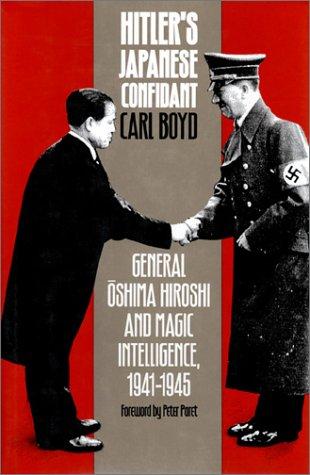Book: Hitler's Japanese Confidant: General Ōshima Hiroshi and MAGIC Intelligence, 1941-1945 by Carl Boyd
Genre: History
Publisher: University Press of Kansas
Publication date: 1993
Pages: 271 (202, if you read the appendices but not the notes)
Source: Hardback borrowed from library
 Summary: Ambassador Ōshima served the Japanese government in Berlin during the years of World War II. He had a good rapport with German's foreign minister, Joachim von Ribbentrop, and with Adolf Hitler. His long conversations were dutifully reported in great detail to the Japanese foreign ministry via encrypted radio messages. In turn, the Japanese foreign ministers (there were several during the war years) asked pointed questions and guardedly reported on Japanese thoughts about war issues.
Summary: Ambassador Ōshima served the Japanese government in Berlin during the years of World War II. He had a good rapport with German's foreign minister, Joachim von Ribbentrop, and with Adolf Hitler. His long conversations were dutifully reported in great detail to the Japanese foreign ministry via encrypted radio messages. In turn, the Japanese foreign ministers (there were several during the war years) asked pointed questions and guardedly reported on Japanese thoughts about war issues.
Neither the Japanese nor the Germans knew that the encryption system used by Japanese diplomats had been broken by Americans before the war. That stroke of both luck and genius meant that American military planners and, later, their British counterparts, knew what Ōshima and the Japanese foreign ministers knew.
As I wrote for my O is for Ōshima post in last year's A-to-Z Challenge, the most significant communication was the series of reports when General Ōshima toured and then described the Atlantic Wall fortifications by Germany in November 1943, just as the D-Day invasion was being planned. Ōshima confirmed, several times, before and after D-Day, that Hitler was convinced that the main invasion would take place at Calais. Hitler believed for more than a month later that the Normandy invasion was a diversionary tactic - an opinion that Ōshima related to Tokyo.
Thoughts: My research for the O is for Ōshima post led me to this book and I'm glad that it did. It's a pretty obscure aspect of World War II, but so fascinating.
I learned an embarrassing amount from this book about the Soviet involvement in World War II. The Germans were keen to have the Japanese invade Siberia to force a two-front war. But the Japanese signed a non-aggression pact with the Soviet Union before World War II. They deemed it in their own best interest to stick to that pact, even while they were in a military alliance with Germany. The Japanese attempted on several occasions to find a way for Germany and the Soviet Union to reach a negotiated peace, but neither party was very interested.
The reason that I'm embarrassed about how much I learned is because of this quote:
"At no time after June 1941 did the Germans have less than two-thirds of their army on the eastern front, and most of the time four-fifths of their army was committed there." (p. 141) My Anglo-American focus on World War II has caused me to miss the bulk of the story. Most of my ignorance stems from my own preference for Anglo-American stories and a similar bias among the people who taught me history. But here's another reason:
The Japanese foreign minister communicated directly with the Japanese ambassadors in Moscow and Berlin on the matter of a possible separate peace, and Anglo-American forces intercepted the complete dialogue. Nevertheless, the full traffic with Moscow has not been declassified, and only certain pieces of evidence can be cited at this time, although all of the Berlin side has been declassified and is available to researchers (p. 141)
 Appeal: I found this very readable even though it's fairly academic - an excellent book for anyone interested in how codes and code-breaking impacted World War II and for hearing a small piece of the Japanese experience of the war in their own words.
Appeal: I found this very readable even though it's fairly academic - an excellent book for anyone interested in how codes and code-breaking impacted World War II and for hearing a small piece of the Japanese experience of the war in their own words.
Challenges: This is a history book for the 2023 Nonfiction Reader Challenge.
Have you read this book? What did you think?


About Joy Weese Moll
a librarian writing about books
